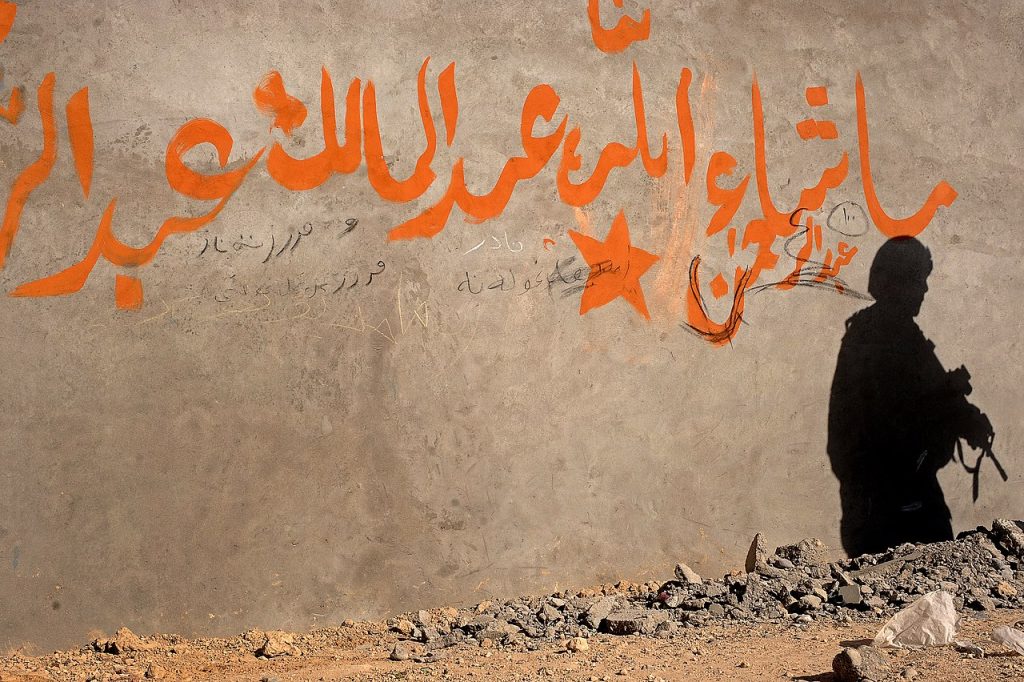Right now, the dominant narrative of those that occupy political and economic power-centres, and those whose careers and lives are wedded to militaries, is that a new world war is looming, and that we need to get ready. One person with such a narrative is the Swedish commander in chief, Micael Bydén, who stated that all Swedes must mentally prepare for war. The German Defence Minister, Boris Pistorius, even has a year: 2029.
The inclination of governments towards war is matched by their military spending. According to Stockholm International Peace Institute, total global military expenditure in 2023 reached 2443 billion USD. That is an all-time high. This spending frenzy on arms takes place against a backdrop of inflation, severe debt crisis, growing inequalities, severe environmental degradation, widespread depletion of public budgets, and privatisation of public services and infrastructure. Clearly, governments prefer waging war over building peace.
While the Swedish commander in chief is anticipating war, armed conflicts are already raging elsewhere: in Yemen, Sudan, Ukraine, Ethiopia, Syria and Western Sahara, to name a few. A genocide is being committed in Gaza. Too many wars have already been fought in whose aftermath populations have lost as much as they did during the war itself. At the interpersonal, societal and economic levels, the costs of recovery have been too great.
Having myself experienced war, displacement and the so-called reconstruction and recovery process, I speak from experience. I wonder if Micael Bydén can say the same? I wonder if, instead of advising people to mentally prepare for war, better advice would be to practically prepare for peace.

U.S. Department of Defense Current Photos / Wikimedia Commons
This path we are on is abysmal. We live war economies. Part of the militaristic discourse is to claim that investments in weapons are not about waging wars but about ensuring peace. More weapons mean better defence, a sort of militarised insurance, we are told. This is nothing but gaslighting.
Cynthia Enloe, one of the most prominent feminist thinkers on militarism, has shown that it is a prerequisite to waging wars. Militarism is deployed to implicitly and explicitly foster societal support for and normalisation of war agendas. If we spend money on weapons instead of the public good, and if we allow our societies to be consumed by militarisation, while discounting peace as naïve and peace activists as dangerous, we will have war.
Under capitalism, that is fine. Profit can be made both from destruction and reconstruction. We might struggle to convince our governments that investing in social infrastructure, care and environmental sustainability is what must be done for this planet to survive, but they don’t need any convincing to spend money on destruction.
They do this knowing not only that money will be made from reconstruction, but also that there is profit to be made from the weakened position of countries coming out of conflict. Especially alluring is the opportunity provided to push through neoliberal policies.
Using peace building as an excuse, international interventions have pushed country after country into austerity measures, rapid privatization of social infrastructure and services, and natural resource extraction. One of the key mechanisms used to apply that pressure have been the conditionalities attached to loans from international financial institutions such as the International Monetary Fund and The World Bank Group, as well as from regional institutions such as the European Bank for Reconstruction and Development.
Through loan conditionalities, countries have been encouraged to do away with labour protection, to introduce tax exemptions for corporations, and to cut down on social benefits. This neoliberal approach has not only contributed to growing inequalities, but has also led to a systematic erosion of the core functions of states, namely to guarantee rights and distribute material, social and political resources, despite the fact that the lack of such resources is one of the root causes of conflicts.
Neoliberal peace-building
Neoliberal ideas have become an important part of the mainstream approach to building peace, at the global, regional and national levels, to a point where we can talk about a neoliberal peace-building model.
The central idea of this neoliberal, capitalist approach to peace is that if countries coming out of war and conflict create an enabling environment and necessary freedoms for market forces – achieved through the elimination of state influence in the economy, deregulation of the market, integration into the multilateral trading system, privatization and austerity measures – the recovering country will experience economic growth. Economic growth will lead to development and stabilisation in internal and external relationships, which will in turn lead to further growth. In combination with individual political freedoms and protection of private property, this will ensure peace.
But the neoliberal peace-building model does not operate in a vacuum. It is underpinned by (gendered) assumptions rooted in militarism, patriarchy, racism, imperialism and, of course, capitalism.
The militarised assumption rests on the idea that the use or threat of force is the most appropriate response, and that it is those with guns who have the legitimacy and right to negotiate solutions to conflicts. Then there is the patriarchal assumption that it is masculine (and thus valued) to be the gun-wielding ‘protector’, and that women and other feminised groups are ‘victims’ without agency (and thus devalued). The neoliberal peacebuilding model also depends on the racist assumption that some lives are worth more than others, and that especially disposable are the lives of racialised communities.
There are also the imperialist and capitalist assumptions about who should decide over how a country should recover and whose interests need to be prioritised. At top of the list are the interests of those men who wield the guns and are the face of the war, and those that hold the money and represent the so-called international community. Conveniently their interests always align. One would not exist without the other.
This neoliberal peace-building model excludes vast segments of our societies designated as a burden (e.g. internally displaced people, refugees, victims of violence), as troublemakers (e.g. feminists, peace activists or those calling out the exploitative nature of this approach), or as useful but politically silenced and disposable labour.
But the neoliberal model has been challenged by researchers, practitioners and those living on the receiving end of its policies. Feminists, in particular, have shown how it has compounded conflicts and inequalities. Political, economic and social disempowerment; dislocation of power and decision-making structures; depoliticization of the conversations on peace; depletion of people and nature; and rapidly growing intersecting inequalities – these are some of the most serious documented consequences of the neoliberal approach.
The irrational belief that what matters is economic growth and not the distribution of resources and community building, is deeply embedded in the capitalist political economy. It is dependent on an extractivist, exploitative and militarised order, nationally and globally, and as such is not only devastating for people but also for the environment. The only ones benefiting are the international and national political and economic elites. For the vast majority, this model does not work; yet it is enforced upon countries as the most natural thing in the world.
From Afghanistan to Bosnia
Take Afghanistan. The state-building interventions championed by the US government, with support from the European Union and other countries, were driven by neoliberal assumptions that the market forces will lead to peace. But instead of promised prosperity in the aftermath of the US invasion, the neoliberal approach nurtured a protracted conflict within Afghan society, feeding off food insecurity, poverty, civilian casualties and other harms.
Zubair Popalzai, deputy head of research at the Centre for Conflict and Peace Studies in Afghanistan, has argued that the reconfiguration of Afghan society, including through the creation of a false sense of security spearheaded by massive military spending, ultimately cleared the path for the Taliban to return. Despite the failures to which they had directly contributed, the US and the supporting countries were able to leave Afghanistan without being held to account.
This approach has come at a huge cost for all Afghans. But for Afghan women and girls it has been catastrophic. Women have lost everything to this misogynist regime. They have been systematically deprived of their fundamental human rights. They have lost their freedom of movement and with it their access to socio-economic rights, especially their right to work and education. They have now even been banned from speaking in public.
Despite the extreme difficulties, Afghan women have organised. Among other things, they have put forward demands that humanitarian aid must aim at disrupting existing power structures instead of normalizing oppression, and that support must be part of broader strategies for peace, equality and justice.
All of this is currently lacking, as the international actors continue to apply the same, failed model. As per the militarised assumption, it is the men with guns that hold the solution. Hence the international actors favour talking to the Taliban over talking with women, who are, as per the patriarchal assumption, seen as mere victims.
Victimising Afghan women and taking away their agency is nothing new, however. A weaponised gender equality narrative, underpinned by an orientalist, patriarchal discourse of ‘liberating’ Afghan women, was central to the framing of the US invasion in the first place.
In the case of Bosnia and Herzegovina, the country I come from, the push to transform the political economy and to integrate the country into the global capitalist market was far greater than the desire to deal with the consequences of war. Trust in market forces was so great that the new Bosnian constitution, an integral part of the Dayton Peace Agreement brokered in 1995, included in its preamble the statement: ‘Desiring to promote the general welfare and economic growth through the protection of private property and the promotion of a market economy’.
As part of the subsequent peace building efforts, international actors focused on measures deeply embedded in capitalist political economy. These included rapid and massive privatization of socially owned enterprises and infrastructure; reforms of taxation laws; and the introduction of a banking system and business-related laws aligned with the interests of those countries and financial institutions that were ‘investing in peace’, particularly the US, EU, Germany, UK, France, Turkey, IMF, the World Bank.
The reforms undertaken, however, never touched the structures of power created by the Dayton Peace Agreement. The interests of the domestic ethno-nationalist elites, and the political and economic control exercised by the international community, remained intact – and still do, 30 years after the war.
Supported by the Women’s International League for Peace and Freedom, Bosnian feminists have been looking into the failures of the neoliberal experiments in Bosnia and Herzegovina for more than a decade. We have been arguing that, through its imperialist approach, the international community has along with the local ethno-nationalist political elite treated the people as if they had no political agency.
We have been demanding a bottom-up approach to political and economic processes, free from imperialist interests and geopolitical scheming; an informed and inclusive social dialogue; and a stop to the neoliberal agenda that has caused a rapid deterioration of women’s rights and equality compared to the pre-war socialist period.
We have argued that the claim that neoliberal reforms are the sole alternative, coupled with the failure to recognize the importance of addressing gendered experiences of war, and the patriarchal and structural inequalities within the peace process, have led to the failed state that Bosnia and Herzegovina is today. The failure to correct course has led to a reality in which we live not peace but the temporary absence of war.
Ukraine
But the example that shows most clearly how influential neoliberal thinking is when it comes to dealing with conflicts and wars, is Ukraine. The extent of the commodification of people’s suffering and the involvement of private actors and foreign interests in the reconstruction efforts in the country is unprecedented.
While Ukraine has been no stranger to neoliberal policies, it was only after the second Russian invasion in February 2022 that the most extreme interventions were pushed through, by those claiming to be acting ‘in solidarity’ with the country. Among other things the Ukrainian government was encouraged to radically intervene in labour laws. This led to several changes towards ensuring more power to the capitalist class. For example, employers were given the right to unilaterally suspend collective agreements; organising in trade unions was made difficult; and those employed in small and medium-sized companies (some 70 per cent of the work force) were removed from the country’s existing labour protection laws.
In an extraordinary demonstration of how wedded to the neoliberal approach Ukraine is, its government signed a Memorandum of Understanding with the global investment fund, BlackRock. In 2022, feminists from around the world came together in their demand to UN Women to end its partnership with BlackRock due to its record of prioritizing profits over human rights or environmental integrity. The global campaign Corporate Accountability has put BlackRock on its Corporate Hall of Shame for its role in driving climate catastrophe, its investments in weapons production, and its role in militarization. The Jubilee Debt Campaign claims that BlackRock is making profit out of Zambia’s debt crisis.
Despite all this, Blackrock has been tasked with guiding the Ukrainian government in accessing and managing private capital and investments as part of the recovery process. Using private capital and investments for recovery is not new: international financial institutions, particularly the World Bank, have been strong advocates of this approach for decades. But what is new is the extent to which it is being used in Ukraine, where the neoliberal co-optation of the recovery process has been taken to a whole new level. Whereas Bosnia and Herzegovina, Northern Ireland, Lebanon and Palestine, who all went through peace negotiations during the 1980s and ’90s, seem to have been testing grounds for neoliberal peace-building, in Ukraine this approach has been perfected.
The influence of Blackrock in Ukraine’s recovery process is visible everywhere. It is visible in the way Ukraine’s president ‘markets’ Ukraine to global capital. Take, for example, his statement at the New York Stock Exchange, in which he painted the reconstruction process in Ukraine as an opportunity for corporations to invest in projects worth hundreds of billions of dollars.
An online platform called Advantage Ukraine promises that Ukraine is ‘the greatest opportunity in Europe since World War II’. It invites entrepreneurs to invest in hundreds of projects, offering them in return deregulations and financial stimulations, up to ten years exemption from corporate income tax, and up to 500 permits for public business services. On the investment menu on offer is the arms industry, natural resources, energy sector, logistics and infrastructure, agro-industrial complex, energy sector and much more.
It is undisputable that, due to damage and destruction caused by Russia, Ukraine needs a massive amount of financial and other types of support. The Rapid Damage and Needs Assessment released by the Government of Ukraine, the World Bank Group, the European Commission, and the United Nations estimates that, as of December 2023, Ukraine will need 486 billion USD over the next decade. But reliance on market-forces and the influence of the private capital on the reconstruction process means that profit will be put ahead of the interest of the people.
Following the simple logic of capitalism, for any capital investments to make sense, an expectation of profit must exist. Money is not invested to meet people’s needs or build sustainable and just peace, but to make more money. That means that the suffering and needs of the population caused by war and violence remain at the periphery of investments, addressed on only if they can be commodified.
The reconstruction of housing, social infrastructure and services such as healthcare, education, cultural institutions, child and elderly care all need to become profitable if a capitalist is to make an investment. Once the initial and basic investments have been made, private investors will start looking at what generates ‘real’ profit: private hospitals, private pharmacies, private child and elderly care, high value apartments and luxury compounds, privatised public transport, private theatres, museums, etc.
One of the strongest pushes towards the use of private capital comes from so-called ‘Team Europe’, namely the EU Commission, the European Bank for Reconstruction and Development (EBRD), and the European Investment Bank (EIB). Ukraine’s recovery approach is knit closely with the country’s EU accession approach. But closer inspection of the various strategies and discussions at the EU level show that the ‘solidarity’ often referred to is centred around the idea that it is private capital that will save Ukraine.
The flagship of the EU’s support to Ukraine, the Ukraine Facility, has stated objectives such as ‘mobilise investments in the private sector for fast economic recovery and reconstruction’. The €33 billion worth of loans and grants planned to be disbursed by 2027 will be raised on the financial market. This so-called support is leading to an ever-growing debt that will become a powerful disciplinary tool in the hands of international financial institutions.
Ukraine had serious economic and social issues long before the Russian invasion. The country was one of the poorest and most indebted in Europe and its public infrastructure was chronically underfunded. In the early 1990s, during its transition to a market economy, Ukraine was heavily conditioned by the International Monetary Fund to reduce subsidies and introduce targeted assistance to the population in exchange for loans. It was also mandated to speed up the privatisation of public enterprises, reduce state deficits and deregulate the market.
The current international support plan, under the guise of solidarity, is based on the same recipe, even though this approach contributed to the Maidan protests in 2013. The main purpose of this approach is not to build peace but to ensure that Ukraine’s economy and budget are stable enough to repay the growing debt, no matter what the costs for the population at large.
Even though cutting back on public spending on health care, education and social support will create a gap in access to rights, the expectation is that private actors and private money will pick up the slack, for a ‘small’ profit in return. Yuiliya Yurchenko and other Ukrainian feminists have called for a radically different approach to recovery – a feminist one based on the principle of social solidarity, aligned with international commitments to women’s human rights.
Politically economy of peace
So how do we build peace that aligns with people’s needs? What kind of political economy is needed? Feminist peace activists have been looking at this question for decades. It has been especially urgent for those of us living outside the capitalist core; whether in countries popularly referred to as the Global South, or those located at the core’s semi-periphery. We have not only been living with war, threats of war and violence, but also with the devastating effects of the neoliberal onslaught on our societies.
We have been looking at the everyday lives of women and other oppressed groups, at their experiences, their traumas as well as their agency and their needs and interest during the process of reconstruction. In collaboration with feminists from around the world, both practitioners and academics, we have been deconstructing the narrative that the neoliberal approach to dealing with conflicts is the only way forward, and that the risk we must live with in the present is measured in potential for new conflicts.
What we have learnt is that recovery and reconstruction after a conflict is not linear. It is a complex, continuous process, whose economic framework cannot be detached from the societal needs that arise because of the war, but that quickly get compounded with everyday life needs and challenges. The economic framework of it must intersect with questions of justice, equality and solidarity. It must be put in the service of transforming structures that led to the conflict in the first place, something that the neoliberal approach, with its focus on economic growth for the benefit of the few, has failed to do spectacularly.
Whether we are supporting countries recovering from war, or trying to stop the next war, our efforts to build peace need to change dramatically. We need to be talking about what peace really means and what policy choices we need to make to ensure that it is not just a respite between times of war (during which we prepare for more war), but an ideological choice constantly reaffirmed through our policies, norms and values. How this looks exactly is contextual. But what feminist peace activists have been able to show is that despite temporal and geopolitical differences, efforts to build sustainable peace need to be just, inclusive and transformative.
A different, feminist approach starts with ensuring full inclusion in peace negotiations and plans for recovery. At the centre of these plans cannot be private actors and foreign countries but women and all the other oppressed and marginalised groups that bear the brunt of the conflict and its consequences. Their inclusion is imperative to our understanding of the gendered harms and violations that took place and what needs to be done to start a process of restorative justice. This will require material and nonmaterial reparations, which should be front and centre of the recovery and reconstruction plans, as they will inevitably intersect with the overall developmental needs of the society. What they will not intersect with is the interests of capital, either domestic or foreign.
Instead of fiscal constraints what we need to do is increase investments in the public sector and services. How and where we invest in social infrastructure must be informed by an understanding of the gendered division of labour. Across conflicts the cost for social reproduction is overwhelmingly paid for by women who provide the labour necessary to sustain communities during times of conflict. In planning recovery and reconstruction efforts, this labour needs to be made visible, and it needs to be valued. Our policies need to aim at transforming patriarchal power structures, the gendered division of labour, and the oppression that is inherent to social reproduction under the conditions of the capitalist political economy.
For people recovering from war, justice is not only a question of war crimes, although they are of course a big part of it. We also need accountability for the violations of our rights when neoliberal reconstruction policies go bad, and for the conditionalities that push countries into neoliberal austerity measures that leave people hungry, disillusioned, afraid and easily manipulated.
But justice is also about transforming the power relationship between our communities and those international and national elites that claim to represent us. Peace is about recognising the power and agency of our communities. It is about the policies and structures that we put in place to repair and restore our dignity and agency throughout all the process starting with peace negotiations all the way through building sustainable peace.















